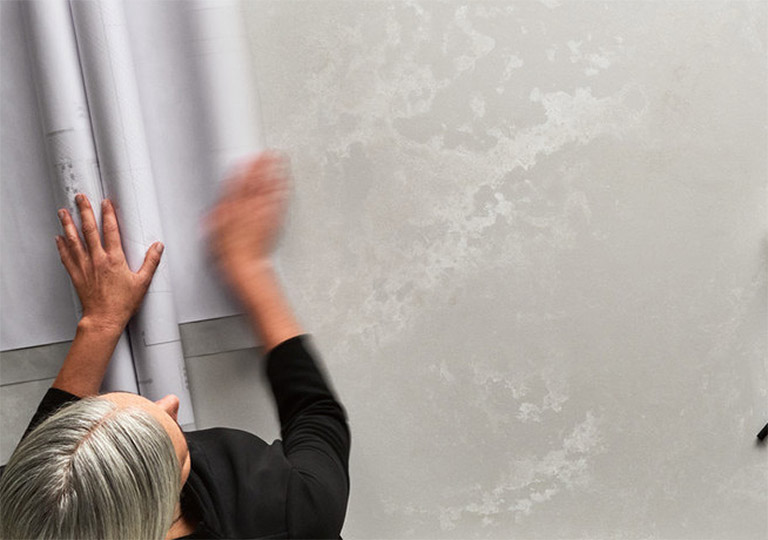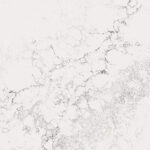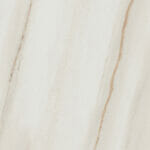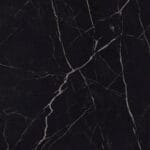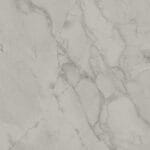Exploring options for your home’s countertops opens up a world of possibilities, with Corian and Quartz standing out as the top choices for many homeowners. But what does each offer, and which is better for your home? This blog answers these questions and more to help you choose the most suitable countertop material for your lifestyle and needs.
Corian vs. Quartz Countertops: Breaking Down the Basics
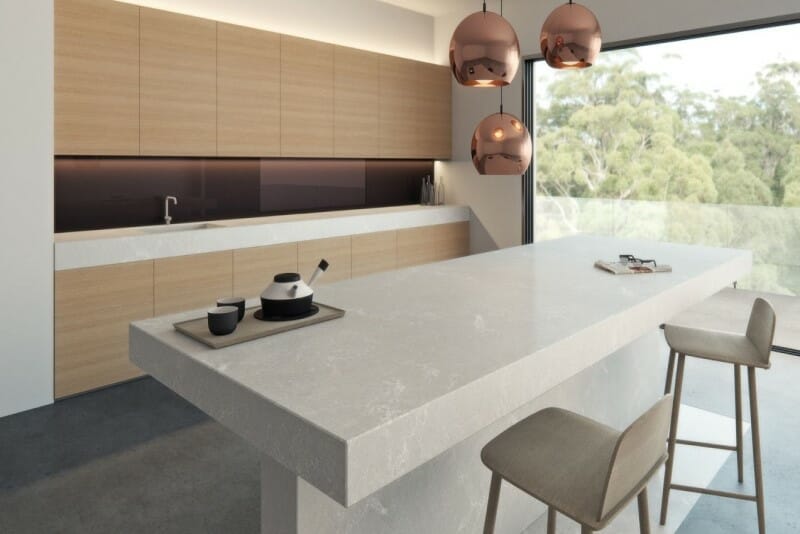
Before diving into the details, it helps first to understand the nature of both Corian and quartz.
What Is Corian?
While a brand name, Corian has become a generic term for all solid surface materials made from a combination of polymer and natural minerals. It is notably more affordable than quartz and other high-end countertop options, making cost-effectiveness one of its primary selling points.
What Is Quartz?
Meanwhile, quartz is a natural stone used in manufacturing quartz countertops. Caesarstone is the pioneer and among the leading and most celebrated quartz countertop brands, making its name almost synonymous with these products.
Similar to Corian, quartz surfaces are created by combining natural minerals and synthetic materials, specifically resins. However, the latter tends to have a higher concentration of natural minerals.
At Caesarstone, our formula consists of approximately 90% quartz; the rest is a mixture of resins and pigments. But what are Corian countertops made of? In contrast, they generally comprise about 33% synthetic polymer and 66% mineral content.
Corian vs. Quartz Countertops: Key Differences and Comparisons
Now that we’ve tackled the basics of these two countertop materials, it’s time to compare them across various aspects. This guide won’t cover every advantage of quartz countertops, but it should highlight why quartz stands out as a practical and desirable material.
What Costs More – Quartz or Corian?
Typically, Caesarstone quartz carries a higher price tag per square foot than Corian. However, quartz countertops boast enhanced durability and lower maintenance requirements, usually presenting a more cost-effective option in the long run.
The Pros of Corian and Quartz Countertops
Pro For Corian: Electrical Conductivity
While the affordability of Corian stands out, it can be challenging to find its other benefits over quartz. One of its innovative characteristics, though, is its ability to support wireless charging. It enables certain Corian countertops to charge mobile devices simply by placing them on the surface. This feature could be particularly beneficial for those who likely use iPads to follow recipes in the kitchen without worrying about running out of battery.
However, remember that opting for this feature incurs a cost. Extra maintenance may also be required to keep this feature functioning optimally.
Pro For Quartz: Durability and Practicality
Laminate countertops have weaker, lower-quality properties. Corian countertops were developed as a superior and more durable alternative to these surfaces.
However, compared to quartz, Corian falls short in terms of resilience and durability. Quartz is renowned for its resistance to scratches, mold, and mildew, features that Corian, despite its strengths, cannot match.
Pro For Quartz: Timelessly Elegant Designs
We all desire for the surfaces in our homes to withstand the hustle and bustle of daily life while maintaining an aesthetic appeal. Experts at Houzz.com highly recommend quartz for its sleek appearance and diverse design options.
The predominantly natural makeup of Quartz ensures its appearance remains timeless. Conversely, experts on Houzz note that Corian carries a distinctly synthetic look and feel.”
Pro For Quartz: Resistance to Heat
When it comes to Corian vs. quartz countertop discussions, it’s best to look beyond just pricing. Durability and resistance to kitchen elements, especially heat, should be significant factors in your decision. The material you select should complement your kitchen’s demands and withstand the rigors of daily use.
Mishaps in the kitchen are common, whether spilling hot liquids or the urgent need to set a hot pan down. While it’s advisable to avoid doing this on quartz countertops, especially those with Honed or Rough finishes, they generally withstand heat better than Corian. As it’s rich in polymer content, Corian possesses minimal heat resistance.
Pro For Quartz: Increased Resale Value
Another factor to consider when debating between Corian and quartz is their potential impact on your home’s resale value. Quartz typically offers a better return on investment by increasing your property’s value than Corian.
This is because consumers often view Corian as a modest step up from laminate rather than a top-tier countertop option. In contrast, quartz has risen in popularity, even outshining natural stone in appeal and desirability.
Rounding It Up: Corian, Quartz, and Your Kitchen’s Functionality
Corian is a brand name that represents solid surface countertops standing in the middle ground in the world of kitchen and bathroom surfaces. These countertops offer a significant improvement over laminate options, providing a blend of functionality and aesthetics that many homeowners appreciate.
However, despite their advantages, Corian surfaces do not quite reach the durability and visual appeal offered by natural stone countertops, such as those made from quartz. Quartz surfaces are an excellent choice for those who want that perfect blend of aesthetics, durability, longevity, and value.
Want to see how a quartz countertop would look like in your home? Order samples of up to four of your favourite colours today.
Frequently Asked Questions
Q: Can you save money by choosing Corian over quartz countertops?
A: Corian may seem more affordable than quartz at first. Its price range is between $40 and $65 per square foot, which is starkly different from quartz, which begins at $40 and can soar to over $200 per square foot.
However, considering Corian’s susceptibility to damage and its lower resale value, it may turn out to be more expensive in the long run.
Q: Does Corian Cost Less Than Granite?
A: Corian offers a more cost-effective option than granite at the initial purchase. Moreover, granite comes with its own problems that could potentially give Corian a slight advantage.
One significant issue with granite is its porous nature, which calls for sealing up to twice a year to prevent staining. Meanwhile, Corian shares a similar advantage with quartz – its nonporous qualities – making it resistant to stains.
Q: Is It Safe To Place Hot Pans Directly on Corian Countertops?
Experts caution against placing hot pans directly onto Corian surfaces, as this will likely result in damage. It’s best always to have trivets and heat pads within reach to protect your Corian countertops. While quartz has a higher heat resistance than Corian, it is not heat proof and will also require the use of trivets and heat pads to protect the surface.
Q: When Did Corian Stop Being a Popular Choice?
In the 1980s, Corian emerged as a sought-after alternative to laminate. Around this time, it captured consumers’ interest in something more upscale. Over the years, it has continued to hold a place in the market, although it hasn’t quite reached the level of popularity enjoyed by quartz.
Q: How Do You Maintain the Shine On Corian Countertops?
Preserving your Corian countertops’ sleek appearance requires regular buffing using a microfiber cloth and a specialized polish.
On the other hand, Caesarstone countertops boast a resilient surface that can maintain its luster for an extended period, even with the most straightforward practices. Wiping away spills quickly and avoiding harsh, abrasive cleaning agents are enough to keep a quartz surface looking its best for years.
Q: Is Corian Prone to Scratching?
Corian is prone to scratching, especially when compared to Caesarstone quartz. This difference in durability can be attributed to the materials’ ranking on the Mohs hardness scale.
The type of plastics that make up Corian countertops fall at two on this scale. On the other hand, the mineral quartz, the primary component of Caesarstone countertops, boasts a much higher hardness rating of seven. This significant disparity explains why Caesarstone is more resilient to wear and tear.
